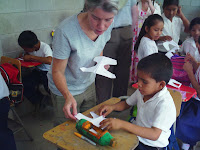Our team of 11 went to the mountain village of El Chico to
distribute water filters and buckets, one per household. As soon as we arrived,
women and children began to gather. We had 100 filters with us but sadly were
only able to acquire 53 buckets, so Pastor Noé asked the village leader to
choose the neediest families to receive the water filters today. Tim will go
back at another time to distribute the rest. Most of the women who came today
had 2-4 children with them, and we were able to give each child a small toy,
mostly new Happy Meal toys donated by children at the home church of this team.
While we were waiting for everyone to arrive (some walked a
very long distance down the mountain), Pastor Noé heard about a 7-year-old boy
in a neighboring house who had been badly burned on the legs after falling into
a charcoal fire pit, and asked Susan, a physical therapist, to go look at him. Jeremy
had spent 15 months in the hospital and his legs are still not healed. He is
not eating because he is in so much pain. Susan was able to instruct his mother
and sister about how to better care for him and help him to move his legs.
Pastor
Noé gave him a brand-new soccer ball as a “hope” gift – something for him to
strive for to encourage his healing. This family received a water filter, so
from now on Jeremy’s mother can stop cleaning his wounds with filthy river
water.
After about an hour of waiting the village leader began
calling names and the women came forward one at a time to receive their
buckets. Several asked about receiving a filter system for another family, but
because the people need to be taught how to clean the filter, only families
with a representative present were allowed to receive one. The first step to
installing a water filter is to drill a hole in the bucket, which is done by
hand-twisting a drill bit through the plastic.
It’s not easy, and I later asked
Tim why we don’t bring a cordless drill, and he said when the people do it
themselves they are invested in the filter system because they helped build it,
so are more likely to take care of it. The whole team moved through the crowd,
helping people. Tim instructed them through the rest of the installation and
did a demonstration.
In
about 30 minutes all of the filtration systems were assembled. The people were
very grateful and spent another 10-15 minutes hugging and thanking the team.
Several wanted to pose for pictures with their buckets. The water filters will undoubtedly have a
huge impact in a village with so many young
children, and we only saw representatives from half of the households.





























